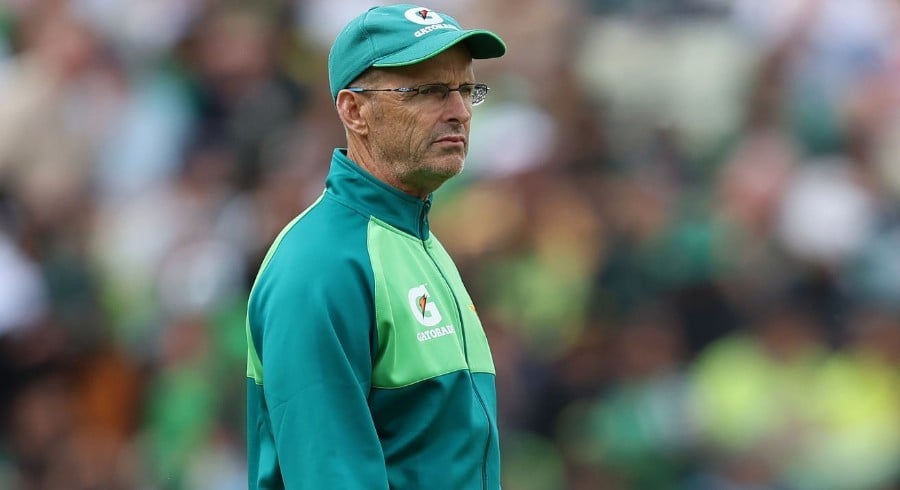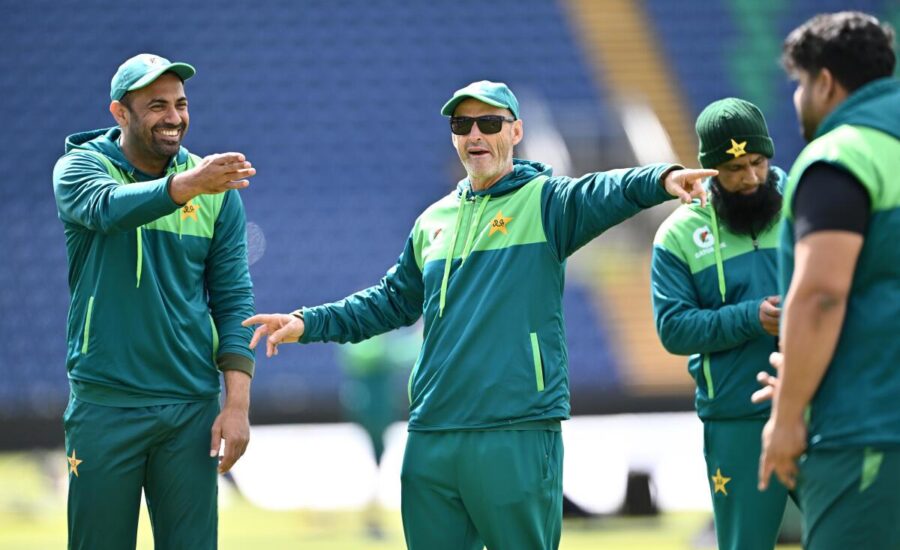Basit Ali, a former cricket player, revealed that Gary Kirsten had been unhappy with Mohammad Rizwan’s selection as Pakistan’s white-ball captain because he had wanted a different player to command the squad.
“He preferred a different player to serve as captain.”
From Rizwan’s selection as white-ball captain and Kirsten’s resignation as T20I and ODI coach to Jason Gillespie’s appointment as all-format head coach, Pakistani cricket has significantly changed in the last 24 hours.
After Gary Kirsten’s resignation was accepted by the Pakistan Cricket Board (PCB), Basit disclosed that the former South African cricket star preferred a player outside the current limited-overs lineup to lead Pakistan since he felt he had “full authority” over such choices.
“When Rizwan was appointed captain, everything began. Gary Kirsten wanted someone who wasn’t on the existing team to take the lead. On his YouTube channel, Basit stated, “He believed he had complete power, but he is unaware that the PCB chairman in our nation can change at any time.
When the PCB revealed the teams for the Australia and Zimbabwe series on Sunday, Rizwan took Babar Azam’s place as Pakistan’s white-ball captain.
With Salam Ali Agha appointed as his deputy for the forthcoming away tours, the seasoned wicketkeeper will now captain the Team in white-ball cricket.
The PCB confirmed Kirsten’s departure 24 hours after Rizwan was appointed, ending his six-month term without having managed Pakistan in an ODI match, a format in which he is very skilled.
Kirsten’s primary responsibility was the 2024 ICC Men’s T20 World Cup in the USA and the West Indies, during which Pakistan lost to India and the USA and had to leave the group stage early.

As a player and coach, Gary Kirsten, whose name is synonymous with cricketing greatness, has significantly influenced the game. Kirsten’s journey was filled with significant turning points, such as leading India to a World Cup victory in 2011 after she played for South Africa and subsequently assumed a transformative coaching job. But there have also been abrupt departures during his career, such as his most recent resignation, which left supporters and commentators perplexed and asking, “Why did Gary Kirsten resign?”
Gary Kirsten’s Cricket Experience
Although Kirsten started as a successful batter for South Africa, his legacy grew when he became a coach. He was an exceptional coach because of his capacity to promote resilience and Team cohesion. His time with the Indian cricket team is particularly cherished because he guided them to a World Cup triumph. His retirement from his most recent coaching position was all the more intriguing, given Gary Kirsten’s creative tactics and compassionate leadership style, revolutionizing his teams.
The Moment That Changed His Coaching Career
Kirsten stands out for his accomplishments as a coach. Thanks to his careful preparation and in-depth knowledge of the game, he brought out the best in his players. His achievements with India encouraged other cricketing nations to consider hiring Kirsten because they thought his methods and insights could improve their results.
Kirsten joined, but why?
Following his triumph with India, Kirsten joined other teams to duplicate his achievements and leave a successful legacy. The squad viewed his participation as an opportunity to strengthen their areas of strength and become a more cohesive team because he was known for being a planned, level-headed coach. At first, Gary Kirsten was thrilled about the chance to direct the Team’s path. She expressed his vision for solid leadership, player-driven development, and a focused, orderly team atmosphere.
Reality vs. Expectations: Gary Kirsten’s Obstacles
The realities of his role brought unanticipated difficulties, notwithstanding Kirsten’s optimism. Fans and Team management alike had extremely high expectations. His cautious, gradual approach to expansion clashed with the demand to produce results immediately. Furthermore, Kirsten found it challenging to realize his vision due to organizational culture gaps and divergent management philosophies. His growing irritation was exacerbated by the complexity of juggling his personal and professional obligations.
The Part Internal Politics Played in Kirsten’s Exit
Internal politics impacted Kirsten’s exit in addition to her on-field performance. Disagreements among management about the team’s direction produced an atmosphere of tension. Kirsten, who favoured cohesion and a unified plan, was at odds with influential people who had different opinions about the Team’s development and approach. As a result of this growing conflict, he finally became disillusioned with his position, and his relationship with the company gradually deteriorated.
Disagreements Regarding Vision and Strategy
Fundamentally, different approaches were one of the leading causes of Kirsten’s resignation. Some stakeholders advocated more aggressive strategies, but Kirsten preferred a disciplined, well-rounded approach to training and gameplay. Because of these opposing ideologies, Kirsten found it challenging to establish a steady, concentrated atmosphere because Team tactics were constantly changing in response to outside demands and divergent viewpoints among the leadership. The disagreement over this vision overshadowed his attempts to provide unity and stability to the Team.
Fans’ and the media’s pressure
Kirsten was stressed due to the media’s and fans’ continual monitoring. When the Team’s performance faltered, the media quickly attacked it, casting doubt on Gary Kirsten’s dedication and strategy. Another source of pressure was the fans’ high expectations, who frequently pointed the finger at Kirsten when the outcomes fell short of their expectations. His best achievements usually went unappreciated because of the constant strain, despite his concept of gradually building the Team and emphasizing skill and tenacity.
Gary Kirsten’s Thoughts and Declarations
In several public remarks after his resignation, Kirsten acknowledged the difficulties he encountered while serving. Although he avoided details, his comments alluded to the more severe problems. Kirsten was disappointed that he could not realize his vision for the club, emphasizing how challenging it was to go forward in such a disjointed setting. He expressed dissatisfaction in his remarks but also a willingness to move on and use the experience to guide his future actions.
Kirsten’s Experience in Comparison to Other Coaches
Other well-known coaches have encountered comparable difficulties in prominent positions, so Kirsten’s situation is familiar. Numerous excellent instructors have left due to internal politics, conflicting ideologies, and significant media attention. By comparing these scenarios, it becomes clear how complicated sports organizations can be and how difficult it may be for even the most successful leaders to succeed in such settings.
Kirsten’s Career Path After Resignation
Following his resignation, Kirsten turned his attention to chances that more closely matched his ideals and coaching style. He prioritized positions in the future where he could operate without undue interference, enabling him to use his techniques more successfully. Kirsten’s exit has acted as a reminder of how crucial it is to find the proper fit and how corporate culture affects a coach’s effectiveness.
The Performance of the Team After Kirsten
After Kirsten resigned, the group had to figure out how to move forward. Throughout the first adjustment period, the squad struggled to reestablish stability and refocus their objectives. Despite some encouraging moments, their performance could have been more impacted by the absence of Kirsten’s leadership and the lack of a cohesive strategy. This stage highlighted Kirsten’s contributions and the difficulties in filling the gap he left.
Things to Take Away from Gary Kirsten Departure
Future coaches and organizations can learn a lot from Kirsten’s resignation. His story emphasizes the necessity of a nurturing atmosphere, a shared goal, and a coordination of coaching and management techniques. Even the most accomplished coaches may find it difficult to leave a lasting impression without these pillars. Kirsten’s experience reminds us that managing relationships and expectations is just as important to effective coaching as having technical know-how.
In conclusion
Internal politics, divergent ideologies, and a great deal of pressure all contributed to Gary Kirsten’s complex decision to leave his coaching position. He tried his hardest to create a disciplined and unified strategy. However, the fundamental problems in the organization made it harder and harder for him to succeed. His exit demonstrates the difficulties that well-known coaches frequently encounter, and serves as a lesson in the value of unity and support within any Team.
